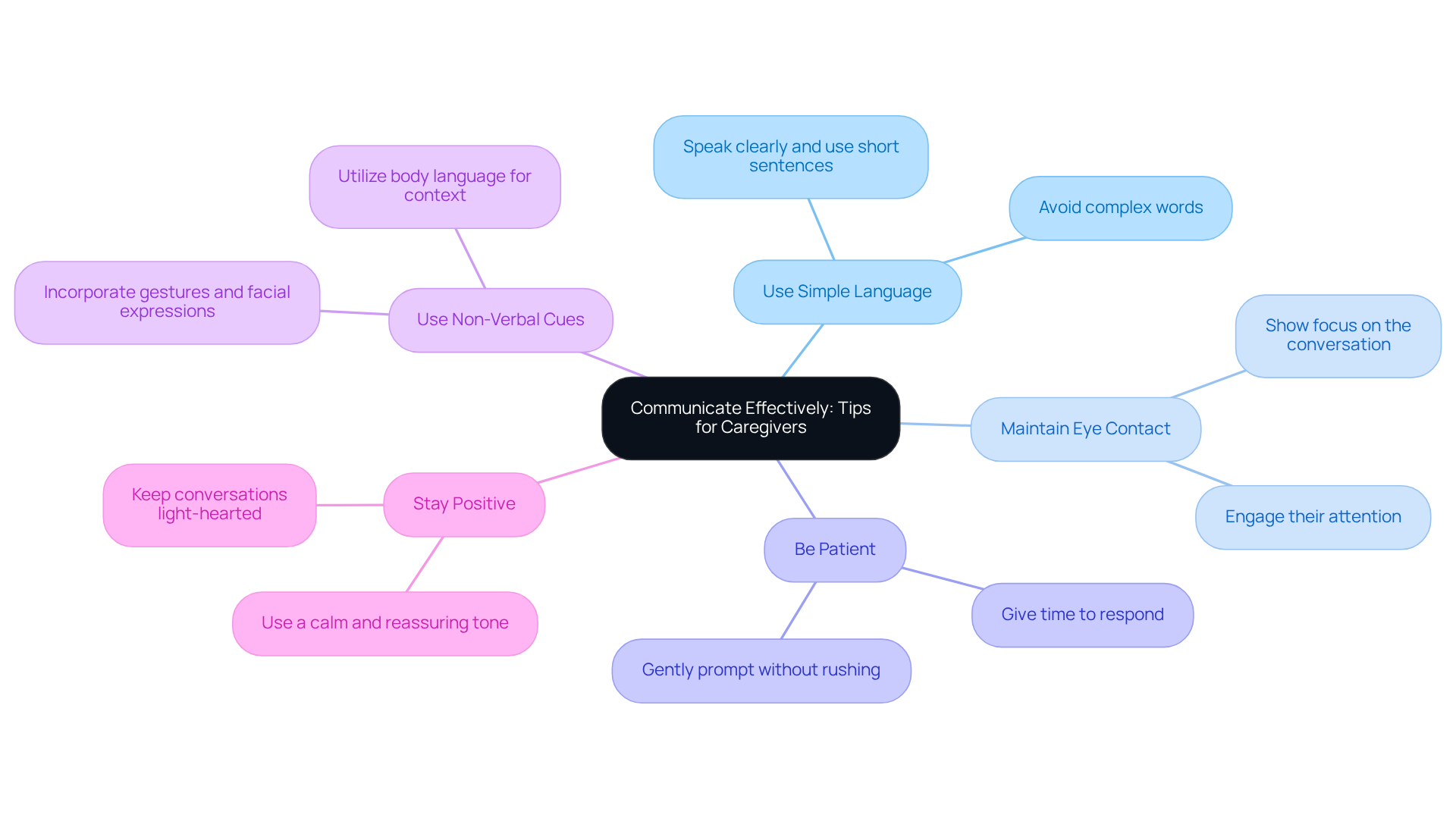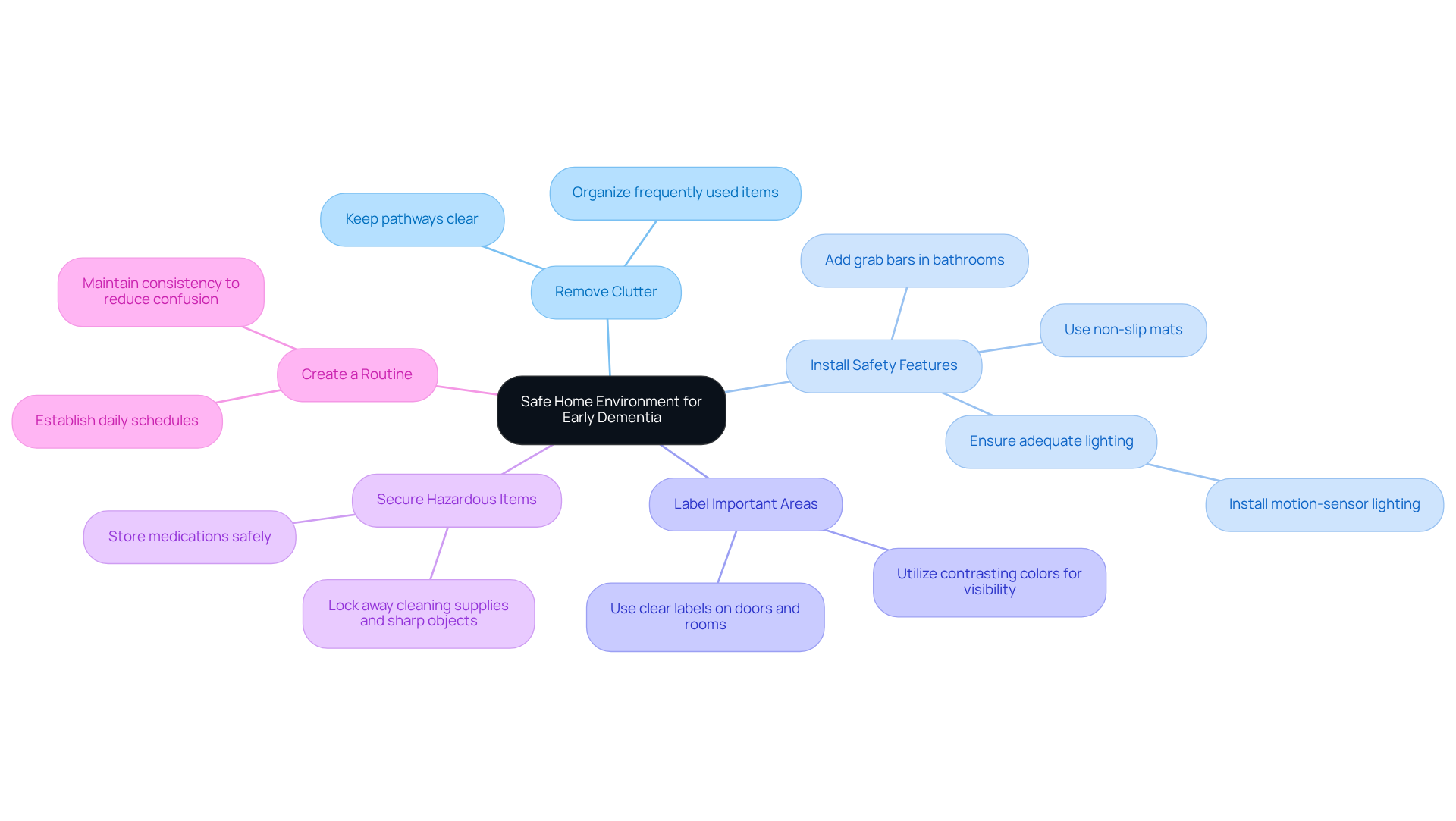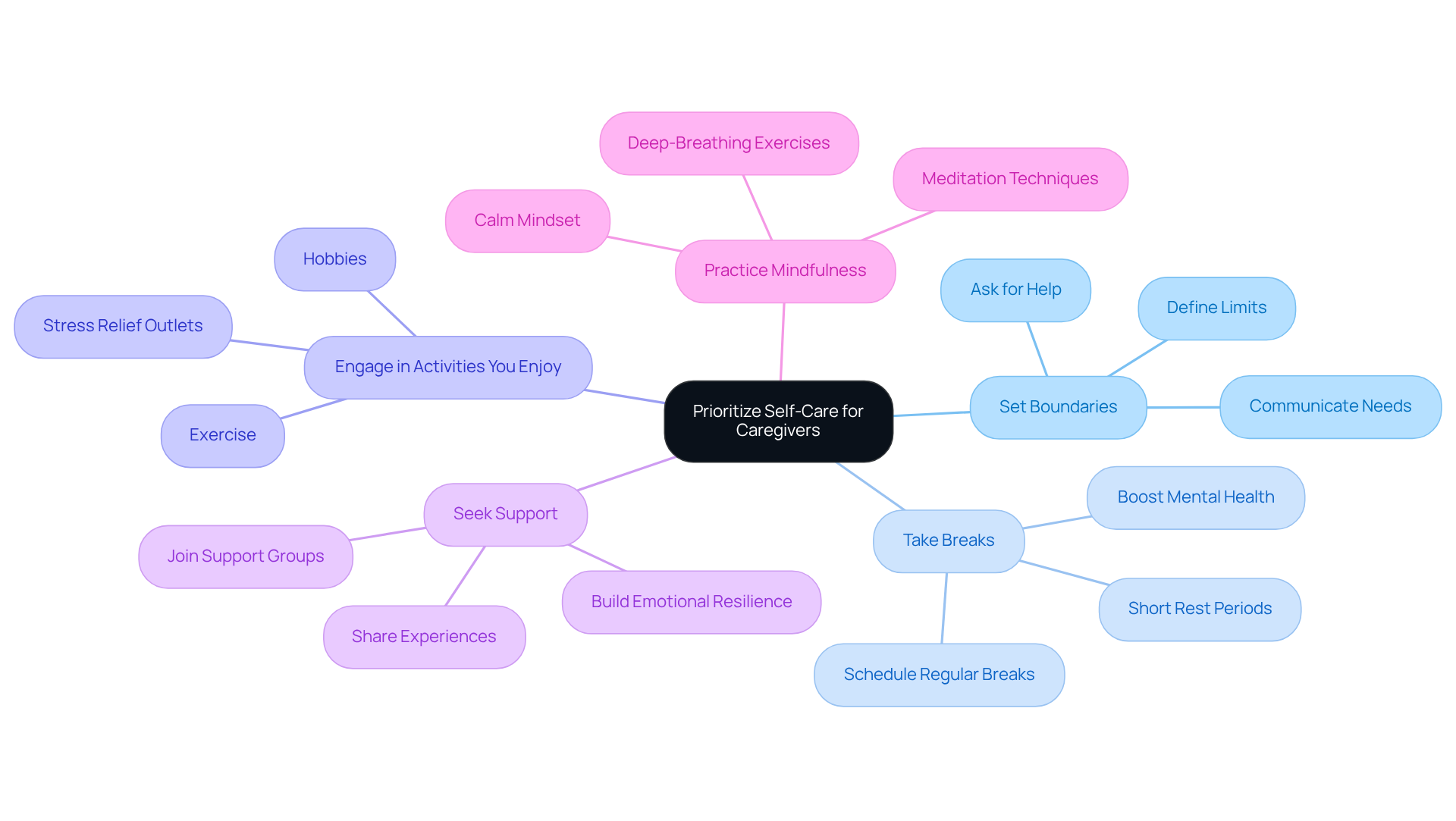Overview
Caring for a parent with early dementia can be an emotional journey filled with challenges. It’s essential for caregivers to recognize the stages of cognitive decline and understand the unique struggles that come with it. Clear communication is vital, as is creating a safe and comforting home environment. Most importantly, caregivers must prioritize their own well-being to prevent burnout.
Using simple language and maintaining routines can significantly ease the stress for both the caregiver and the loved one. These strategies not only foster compassionate support but also help caregivers feel more in control. Remember, it’s okay to seek help and take breaks. Self-care isn’t just a luxury; it’s a necessity for providing the best care possible.
As one caregiver shared, “Finding moments for myself made all the difference. It allowed me to be more present and patient with my parent.” This sentiment resonates with many who walk this path. By embracing self-care, caregivers can enhance the quality of care they provide, ensuring that both they and their loved ones feel supported.
In this journey, you’re not alone. There are resources and communities ready to offer emotional and practical support. Take heart in knowing that your efforts matter, and with compassion for yourself, you can navigate this challenging time with grace.
Introduction
Understanding the complexities of early dementia is vital for caregivers on this challenging journey of supporting a loved one. As memory loss and confusion become more common, the need for effective strategies and a compassionate approach grows increasingly important. Caregivers often wonder: how can they meet the emotional and physical needs of a parent facing this condition while also taking care of themselves?
This guide offers essential tips and insights to empower caregivers. It focuses on:
- Fostering a nurturing environment
- Communicating effectively
- Creating a safe home
Most importantly, it emphasizes the significance of self-care in this demanding role. Remember, you’re not alone in this journey; there are ways to navigate these challenges with grace and support.
Understand Early Dementia: Symptoms and Stages
Early dementia brings a host of challenges, including memory loss, confusion, and shifts in mood or behavior. For caregivers, understanding the stages of cognitive decline is essential to provide the right support:
-
Mild Cognitive Impairment (MCI): This initial stage often shows noticeable memory lapses, like forgetting recent conversations or misplacing items. It’s estimated that around 7.4 million Americans are affected by MCI, with many cases going undiagnosed. Neurologists emphasize that recognizing MCI early can lead to better treatment outcomes, making awareness vital. A nationwide survey revealed that 99% of Americans believe prompt diagnosis is crucial.
-
Early Dementia: As the condition progresses, symptoms become more pronounced. Individuals may find themselves forgetting things more often, struggling to follow conversations, or facing difficulties in planning and organizing tasks. Research shows that nearly 10 million new cases of dementia emerge each year, and timely intervention can significantly improve quality of life. This highlights the importance of recognizing these changes swiftly.
-
Moderate Dementia: At this stage, daily activities can become overwhelming, and significant memory loss often requires assistance with personal care. Caregivers should be ready for these challenges, particularly when considering how to deal with a parent with early dementia, as the need for support grows.
By familiarizing themselves with these stages, caregivers can better understand how to deal with a parent with early dementia and adapt their approach to meet the changing needs of their loved ones. This ensures that they receive the compassionate care they deserve as the condition progresses.
Communicate Effectively: Tips for Caregivers
Learning how to deal with a parent with early dementia can be challenging, but with a few thoughtful strategies, you can create a nurturing environment. Here are some tips to help you connect:
- Use Simple Language: Speak clearly and stick to short, straightforward sentences. Avoid complex words that might confuse them.
- Maintain Eye Contact: This helps engage their attention and shows that you’re focused on the conversation.
- Be Patient: Give them the time they need to respond. If they struggle to find the right words, gently prompt them without rushing.
- Use Non-Verbal Cues: Gestures, facial expressions, and body language can help convey your message and provide context.
- Stay Positive: Use a calm and reassuring tone, and try to keep the conversation light-hearted to ease any anxiety.
By implementing these strategies, you can foster a supportive atmosphere that encourages open communication on how to deal with a parent with early dementia. Remember, it’s all about creating a space where they feel understood and valued.
Create a Safe Home Environment: Essential Modifications
Creating a safe home environment for a parent with early dementia is essential, especially when learning how to deal with a parent with early dementia and understanding the emotional challenges you may face. Here are some thoughtful modifications to consider:
- Remove Clutter: Keeping pathways clear of obstacles can help prevent falls. Organizing frequently used items within easy reach can make daily tasks feel less daunting.
- Install Safety Features: Adding grab bars in bathrooms, non-slip mats, and ensuring adequate lighting can significantly enhance safety. Motion-sensor lighting is a wonderful addition, especially for those nighttime trips to the bathroom.
- Label Important Areas: Clear labels on doors and rooms can assist your loved one in navigating their home more easily. Using contrasting colors for better visibility can help them locate items around the house with greater confidence.
- Secure Hazardous Items: It’s crucial to store away medications, cleaning supplies, and sharp objects to prevent any accidental ingestion or injury. This simple step can provide peace of mind.
- Create a Routine: Establishing a daily routine can foster a sense of security and lessen confusion about what to expect throughout the day. Routines can be comforting and help maintain a sense of normalcy.
These modifications not only help preserve a sense of independence but also provide guidance on how to deal with a parent with early dementia to ensure safety at home. According to the Alzheimer’s Association, 60% of Alzheimer’s patients tend to wander, which underscores the importance of these safety measures. Moreover, creating a nurturing environment is vital for emotional support and is an essential aspect of how to deal with a parent with early dementia, allowing individuals with dementia to thrive in their familiar surroundings. Remember, you’re not alone in this journey; there are resources and support available to help you every step of the way.
Prioritize Self-Care: Strategies for Caregiver Well-Being
As a caregiver, prioritizing self-care is essential. Here are some strategies to help you navigate this journey:
-
Set Boundaries: It’s important to clearly define your limits and communicate them to your family. Remember, asking for help isn’t a sign of weakness; it’s a vital step in maintaining your well-being. Mental health professionals stress that recognizing your limits can prevent burnout and enhance your ability to care for others.
-
Take Breaks: Make it a point to regularly schedule breaks for yourself. Even short moments of rest can significantly boost your mental and emotional health, allowing you to return to caregiving with renewed energy. Research shows that caregivers who take breaks report lower levels of stress and anxiety, along with a noticeable improvement in their overall well-being (P = 0.028).
-
Engage in Activities You Enjoy: Carve out time for hobbies or activities that bring you joy—be it reading, gardening, or exercising. These enjoyable moments can serve as crucial outlets for stress relief, fostering a healthier caregiver-patient dynamic.
-
Seek Support: Consider joining a caregiver support group. Sharing your experiences with others who understand your challenges can alleviate feelings of isolation and provide valuable insights. Ann M. Steffen highlights that such connections are vital for emotional resilience and can greatly enhance your caregiving experience.
-
Practice Mindfulness: Incorporate mindfulness techniques like meditation or deep-breathing exercises into your daily routine. These practices can help reduce stress and improve mental clarity, allowing you to approach caregiving with a calmer mindset.
By prioritizing your own needs, you’ll be better equipped to offer compassionate and effective care for your loved ones. Research indicates that those who actively engage in self-care not only enhance their own well-being but also improve the quality of care they provide, nurturing a healthier dynamic in the provider-patient relationship. Understanding the psychological costs of caregiving, as highlighted in various studies, underscores the importance of self-care strategies in alleviating caregiver burden.
Conclusion
Caring for a parent with early dementia can be an emotional journey, filled with challenges that weigh heavily on the heart. It’s essential to recognize the stress and burnout that caregivers often face. By understanding the symptoms and stages of dementia, you can tailor your approach to meet your loved one’s evolving needs, ensuring they receive the compassionate support they truly deserve.
Key strategies can make a world of difference:
- Using simple language
- Maintaining eye contact
- Creating a clutter-free home
These strategies can significantly enhance your caregiving experience. Remember, prioritizing your own self-care is just as important. Engaging in activities that bring you joy, setting healthy boundaries, and seeking support from others can help alleviate stress and prevent burnout. This way, you can be more present and effective in your role.
The challenges may feel profound, but with the right knowledge and tools, you can navigate this journey with grace and resilience. Embracing these insights not only empowers you as a caregiver but also enriches the life of your loved one. Together, you can foster a nurturing environment where love and understanding prevail, creating moments of connection that truly matter.
Frequently Asked Questions
What are the early symptoms of dementia?
Early symptoms of dementia include memory loss, confusion, and changes in mood or behavior. Individuals may experience noticeable memory lapses, such as forgetting recent conversations or misplacing items.
What is Mild Cognitive Impairment (MCI)?
Mild Cognitive Impairment (MCI) is the initial stage of cognitive decline, characterized by noticeable memory lapses. It affects around 7.4 million Americans, many of whom remain undiagnosed. Early recognition of MCI is crucial for better treatment outcomes.
How can recognizing MCI early impact treatment?
Recognizing MCI early can lead to better treatment outcomes, as timely intervention is essential. A nationwide survey indicated that 99% of Americans believe prompt diagnosis is crucial.
What happens during the early stages of dementia?
In the early stages of dementia, symptoms become more pronounced, including increased forgetfulness, difficulty following conversations, and challenges in planning and organizing tasks. Nearly 10 million new cases of dementia are reported each year.
What should caregivers expect during the moderate stage of dementia?
During the moderate stage of dementia, individuals may struggle with daily activities and experience significant memory loss, often requiring assistance with personal care. Caregivers should be prepared for these challenges.
How can caregivers adapt to the changing needs of a loved one with dementia?
By familiarizing themselves with the stages of dementia, caregivers can better understand the needs of their loved ones and adapt their approach to provide compassionate care as the condition progresses.





